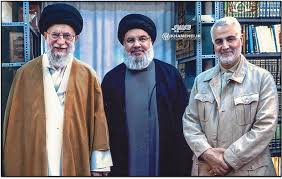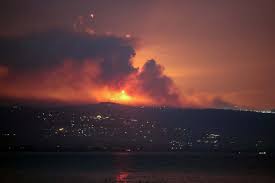Escalation of Violence Between Israel and Hezbollah: A Complex Conflict
The recent escalation of violence between Israel and Hezbollah has thrust the region into turmoil, with airstrikes and retaliatory attacks. This latest round of conflict, rooted in decades of regional hatred and territorial disputes, is a manifestation of both historical grievances and modern geopolitical dynamics. The conflict flared up after a series of provocations from both sides. Hezbollah, the Iran-backed militant group based in Lebanon, has long positioned itself as a defender of Palestinian rights, often launching rocket attacks against Israeli territories. In recent months, Hezbollah has reportedly increased its military activities along the Israel-Lebanon border, leading to heightened tensions. Analysts suggest that these provocations are not merely military maneuvers but also strategic posturing aimed at solidifying Hezbollah’s influence in the region amidst changing alliances.
In response to these provocations, Israel has ramped up its military operations, employing advanced technology to target Hezbollah’s infrastructure. The Israeli Defense Forces (IDF) have conducted extensive airstrikes, reportedly hitting thousands of targets in Lebanon, including military installations and supply routes used by Hezbollah. Israel’s military capabilities, including sophisticated drones and precision-guided munitions, have allowed for a level of accuracy in their strikes that aims to minimize collateral damage while maximizing operational effectiveness.
The location of these strikes has drawn significant international attention. Southern Lebanon, particularly areas close to the border with Israel, has been a focal point for the IDF’s operations. The sheer scale of the Israeli aerial campaign has raised alarms among international observers regarding the humanitarian impact on civilians. Reports indicate that the recent bombardments have resulted in substantial civilian casualties and widespread destruction, prompting calls for restraint from various global entities. This conflict also reflects the broad geopolitical landscape, where regional powers such as Iran and the U.S. influence the actions of their respective allies. Hezbollah’s alignment with Iran serves to embolden its military actions against Israel, while Israel’s reliance on Western military support, particularly from the U.S., ensures it maintains a technological edge in the conflict. The interplay of these dynamics creates a complex situation that complicates prospects for peace and stability in the region.

Disparities in International Responses
Organizations such as the United Nations (UN) and various human rights groups have condemned Israel’s military operations, particularly the high civilian toll resulting from airstrikes. Reports from Amnesty International and Human Rights Watch have called attention to potential violations of international law by Israel. However, similar scrutiny of Hezbollah’s actions—such as its rocket attacks on Israeli territory and its role in escalating tensions—has been less pronounced. This disparity raises questions about the objectivity of these international bodies and their commitment to holding all parties accountable for their actions. Countries like Iran openly support Hezbollah and have been vocal in their criticisms of Israel’s military operations. The UN’s stance often emphasizes the need for both sides to exercise restraint, but many argue that this approach fails to adequately address Hezbollah’s provocations, which include launching rockets into Israeli territory and maintaining a military presence near the Israeli border.
Additionally, the West’s engagement with Hezbollah is often hampered by the group’s designation as a terrorist organization by the U.S. and other Western nations. While this designation serves to justify military support for Israel, it also complicates any diplomatic efforts aimed at addressing Hezbollah’s actions, resulting in a lack of robust international intervention or pressure against the group.
Potential for Escalation
The current situation has the potential to escalate significantly. Should Hezbollah continue its military provocations, Israel may respond with even greater force, further widening the conflict. Predictions suggest that if the cycle of retaliation continues, it could draw in additional regional players. Iran’s involvement in supporting Hezbollah militarily could intensify, leading to a broader confrontation involving not only Israel and Hezbollah but also other nations sympathetic to either side. Furthermore, the involvement of the U.S. in supporting Israel through military aid and diplomatic backing could lead to an increased military presence in the region. This might provoke a response from Iran and its allies, resulting in a larger-scale conflict that could engulf neighboring countries and disrupt the already fragile stability in the Middle East. The situation remains highly volatile, with international diplomatic efforts struggling to keep pace with the rapidly changing dynamics on the ground.
The ongoing conflict between Israel and Hezbollah has once again highlighted a perceived imbalance in how the international community addresses the actions of both parties. While Israel often faces substantial criticism for its military responses, particularly concerning civilian casualties, Hezbollah’s aggressive posture and provocative actions frequently escape the same level of scrutiny. The international community must comprehend with the implications of its responses and the broader consequences of allowing the cycle of violence to continue unaddressed.








